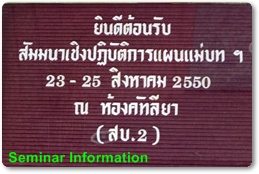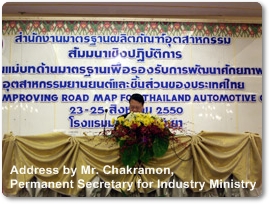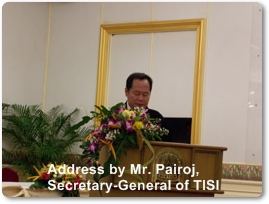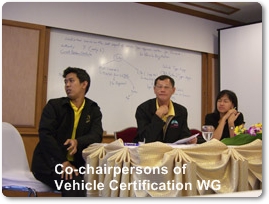Report on Attending TISI Seminar |
by Tadaomi Akiba (JASIC)
August 2007
|
| Since its accession to the 1958 Agreement under UN/ECE/WP29 in May 2006, Thailand has been working on building the necessary regulation/certification systems in the country, including establishment of vehicle certification system and technical regulations.
This TISI seminar was held to discuss the certification system to be established in Thailand for adopting technical requirements related to parts/systems, for which the Thai Industrial Standards Institute (TISI) is responsible.
JASIC was invited to this seminar, and through making presentations on how to establish certification system under the 1958 Agreement and to build infrastructure for the realization of mutual recognition of certification, we joined the Thai officials and industry representatives in the discussions on various measures to be taken by TISI in the future.
To date, JASIC has been participating in the activities of UN/ECE/WP29 as a government-industry body to support the Japanese government. In addition, we have been developing our own activities, including organization of government-industry meetings, in order to help Asian countries for the realization/expansion of regulation harmonization and mutual recognition of certification under the 1958 Agreement.
|
This year marks the 20th anniversary of the founding of JASIC. As a new step into the next stage of our activities, we have just established and started to implement long-term action plans with the goals to be achieved by 2015. These new activities, which indicate the future tasks to be taken by Thailand and other Asian countries, were also introduced at the TISI seminar.
|
|
| 1) |
Dates: 23-25 August 2007 |
| 2) |
Venue: Montien Hotel Pattaya, Thailand |
| 3) |
Attendees: About 50 people from Thailand’s Ministry of Industry, Thai Industrial Standards Institute (TISI), Department of Land Transport (DLT) under Thailand’s Ministry of Transport and Communications, Pollution Control Department (PCD) under Thailand’s Ministry of Natural Resources and Environment, Thailand Automotive Institute (TAI), Thai Automotive Industry Association (TAIA), Thai Auto-Parts Manufacturers Association (TAPMA), Japan Automobile Manufacturers Association (JAMA), TUV Rheinland, TUV Sud, JASIC, and others |
| 4) |
Summary of the seminar:
* Following the opening addresses by Mr. Chakramon, Permanent Secretary for Thailand’s Industry Ministry, and Mr. Pairoj, Secretary-General of TISI, a panel discussion was held by representatives from industries. At the panel discussion, a number of proposals, including solutions to the current problems, were made with regard to Thailand’s future certification system. The participants expressed their opinions very frankly; in particular, they pointed out that the purposes of the government’s administrative measures should be clarified, that it is necessary to involve the industries in the standard-drafting process, that the system should be based on adoption of the ECE Regulations, that it is important to harmonize regulations internationally, that they should clarify which governmental body will carry out the certification, that the division of responsibilities between DLT and TISI should be clearly defined, etc.
|
|
| |
* After the panel discussion, the participants were divided into three working groups for discussing specific issues. I joined the working group for the discussion on vehicle certification as an adviser, and together with the other members, analyzed the current conditions in Thailand and summarized the proposals for the future. |
| |
As the result of the analysis of the current conditions, the following problems were presented:
a) The government’s administrative measures for certification system are not clear;
b) More than one regulation exists for the same requirement;
c) It takes too much time to obtain certification, and interpretation of the standards differs from official to official;
d) the regulations are not internationalized, and it is not clear how to incorporate the amended ECE Regulations into the national system;
e) The necessity for testing facilities should be discussed.
As the result of the discussion, the proposal to be submitted by the working group was summarized as follows:
a) There should be only one certification body for vehicle registration;
b) Adoption of ECE Regulations and acceptance of ECE approvals;
c) Organization/integration of the existing regulations;
d) Infrastructure for the certification body and education of testing officials, etc.
The working group decided to discuss these issues even further.
|
| |
* JASIC introduced its activities under UN/ECE/WP29 in Japan as well as its scheduled activities in the future. TUV Rheinland’s Malaysia Office also introduced the WVTA system in the EU and its relation with ECE Regulations, and JAMA explained the concepts for vehicle certification system and adoption of ECE Regulations.
|
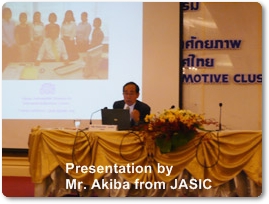 |
| |
* To conclude the seminar, the three working groups presented the following proposals for TISI.
a) Environment WG: TISI should use global regulations (such as ECE Regulations). Compulsory standards should be published in English as well. The scope of responsibility of TISI should be clarified. The possibility of electronic certification system should be considered. As COP standards, ISO 17025 or standards in ECE Regulations should be accepted as an alternative.
b) Safety WG: Various obligations for obtaining certifications should be unified. Test reports issued by technical services under the 1958 Agreement should be accepted. Inspection standards for COP should be simplified. Educational programs should be implemented through collaboration with TAI to produce certification experts. Cooperation from the industries should be accepted in drafting standards. The ECE Regulations formulated under WP29 should be followed. Interpretation of the standards should be clarified with help from outside organizations and it should be publicized. The same standards should be applied to both imported and nationally-produced vehicles/parts. TISI should create and implement compulsory standards for systems as well (e.g., ECE R13). |
| |
c) Vehicle Certification WG: It should be clarified that only one certification body will issue certificates. Redundant standards between TISI and DLT should be unified into a single standard. The certification process should be internationalized based on ECE Regulations. Education for testing officials and infrastructure for testing facilities should be provided by the government. An organization capable of timely and appropriate amendment of regulations should be built. Partnership between TISI and vehicle manufacturers, motorcycle manufacturers, and parts manufacturers should be rebuilt.
|
|
| |
Through this seminar, we were able to join in-depth discussions on issues such as the division of responsibilities between DLT and TISI, which has been our concern for a long time. We also achieved our objective to deepen their understanding of adoption of ECE Regulations through our presentations and opinions.
I felt that JASIC’s role in Thailand will become increasingly important in their efforts to address issues such as how to promote adoption of ECE Regulations as a Contracting Part to the 1958 Agreement after the establishment of Thailand’s vehicle certification system is accepted at the Parliament as well as how to build a system to take advantage of the merits of mutual recognition of certification.
JASIC intends to further strengthen our solidarity with not only DLT but also TISI as the Thai government’s body for standardization and certification.
|
| |
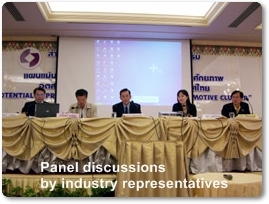 |
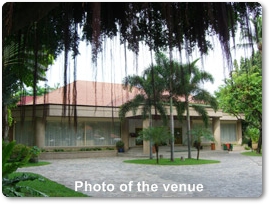 |
|
|




